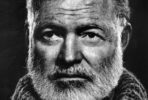Big Questions Writers Need to Ask

Every writer begins by imbibing with a lethal mix of enthusiasm and ignorance. Here are the big questions that can turn that poison elixir into a welcoming brew that satisfies the biggest question: Should I try to be writer?
Inspiration for this article on writing questions came from a new client who wrote to me this week and asked:
I have read a little of Fiction Writing for Dummies. Are there any hand-holding guides that literally lead a first time fiction novel author through the steps in producing the plot, protagonist, hero, universe, etc. in the most expedient and time-saving way? I know it’s a big investment and a lot of time over a year or two or three to write a book, and that part, making the real commitment is what is holding me back. I may be able to commit to it if I can see the light at the end of the tunnel and take a very deliberate structured approach so I don’t feel I am aiming blindly in the dark or wasting any time.
Oh, my, big questions. There are hundreds of books, guides and courses on writing, each focused for different purposes and many with differing opinions on various aspects of the subject.
I know writers who have spent years studying HOW to write and still don’t have a completed manuscript to show for it.
Others write blindly and end up with a manuscript but the story meanders or flounders or doesn’t even get off the ground.
Strike a balance between learning to write and writing.
Neither—alone–will do the job.
It takes a healthy dose of learning and then lots of writing. And not necessarily in that order, either.
Commitment?
Yes, it takes even more commitment than anything. Because, for all the fun there is in writing, there are LOTS of reasons that writing is tedious, disappointing and confusing.
Hand-holding?
Well, a book can only go so far with that. How-to books need to be generic enough to cover lots of writers. No book can see over your shoulder at your specific story idea and say, “Okay, you’ve got this aspect down pat but you forgot about…”. And if you HAVE overlooked something important, you really need an experienced and human eye to point it out.
That is why so many writers look to BETA readers and critique groups to help along the way, although that can entail other problems. Do those readers grasp your intended tone and message, know that specific marketplace, and can they effectively explain how to fix a problem even if they do see it?
Which, not surprisingly, brings me to the idea of getting professional help for that hand-holding you are asking about. Well, of course, I’d suggest professional coaching and editing, because that’s what I do. But let’s take a step back first and start at the beginning.
Start Here:
So where do you even start? No matter what path you take, writing is an investment. It requires: time to grow in your writing style and abilities
- money to gain the background or get the advice you need
- willingness to step out of your comfort zone to promote yourself
- sacrifice as you set aside other activities in your life
- effort as you sit for hours on end writing, revising and polishing
- fortitude as you listen to criticism
- discernment as you sort through the myriad advice, to find your personal style, voice and path as a writer

Ask Yourself These Questions FIRST:
BEFORE you buy a stack of how-to-write books, spend hundreds of hours writing, or start asking questions of others, answer these:
- Why do I want to write? Is it a burning itch that I’ve had for years that won’t be satisfied until it is scratched? Or a passing idea that, if left untouched, will likely fade?
- What attracts me to writing? The desire to share an idea or make money or see my name on a book or feel accomplished at this task or … what?
- Do I understand the difficulties of attracting an agent or a commercial publisher? Am I willing to leap this hurdle if it takes a really long time? Like months or years?
- Am I willing to invest the time and effort and money to go the self-publishing route?
- If I quit writing, how would I feel?
HINT: There are no right or wrong answers to the above questions.
By answering them, you might discover that your intentions are not strong enough or your willingness not as committed as writing requires. Or … you might realize–and admit–that you really DO want to write, must write, regardless of the obstacles you might encounter.
What most people who end up actually writing come to realize is that this is a creative activity that they simply must explore and enjoy and grow into, even if it takes years, even if it means revision after revision, even if it ends up in only a few self-published books to hand out to friends.
Writers have: A need to create – A need to grow – And a need to share
The Light at the End
We are all aiming blindly in the dark to at least some degree when we write. The more you write and study and network, the less blind you will feel and the more structured you can plan your writing projects.
So what IS that light at the end of the tunnel? That’s the beacon that shines at “The End” of each story.
Share the highlights (accomplishments, insights, or inspirations) in the comments below that have helped YOU on your journey as a writer!
WANT HELP?
Contact me directly with an email and let’s discuss YOUR book project!







